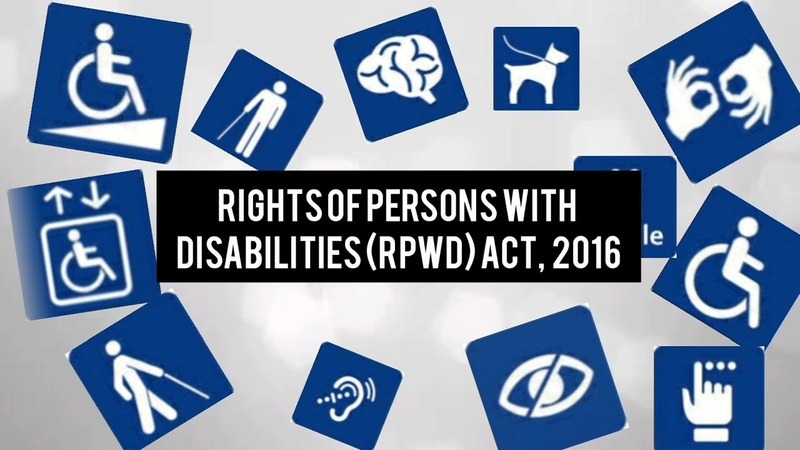1.Discuss the role of State Commissioners for Disabilities under the Rights of Persons with Disabilities Act, 2016 (RPWD Act) in India. What challenges do they face in fulfilling their responsibilities, and how can their effectiveness be improved?
●The 2011 Census indicated that persons with disabilities constitute 2.21% of India’s population. However, more recent data, like the 2019 WHO Disability Model Survey, reveals a much higher prevalence of severe disabilities among Indian adults (16%).
●India ratified the United Nations Convention on the Rights of Persons with Disabilities (UNCRPD) in 2007, which led to the formulation of the Rights of Persons with Disabilities Act, 2016 (RPWD Act), replacing the 1995 law that failed to promote a human rights-based approach.
Role of State Commissioner for Disabilities under RPWD Act:
●Unique Provisions:
The RPWD Act mandates the creation of the office of State Commissioner for Disabilities, which has a combination of review, monitoring, and quasi-judicial functions.
●Judicial Powers:
Section 82 of the RPWD Act empowers State Commissioners with civil court powers under the Civil Procedure Code, and every proceeding before them is considered a judicial proceeding under the Indian Penal Code (IPC).
Challenges in Implementation:
●Lax Attitude of State Governments:
Many State governments have not adequately empowered the office of the State Commissioners, hindering the effective enforcement of disability rights. This issue has been highlighted in the writ petition WPC 29329/2021, where delays in the appointment of State Commissioners were criticized.
●Appointment of Commissioners:
○The RPWD Act suggests that commissioners should have significant experience in law, human rights, social work, or disability advocacy.
○However, in practice, many State Commissioners are civil servants from the nodal ministry, which conflicts with the goal of an impartial and independent office that can oversee executive functions.
●Limited Independence:
○Only a few states have appointed non-civil servant commissioners, and the absence of independent leadership hinders effective implementation of the law.
○Progressive States, such as Karnataka, have appointed civil society representatives and women with disabilities to the commissioner role, which has shown positive outcomes.
Failures and Gaps in Action:
●Inadequate Use of Quasi-Judicial Powers:
The State Commissioners have the power to intervene suo motu in cases of violations of the RPWD Act but have largely failed to take action on discriminatory policies or practices.
●Lack of Accountability:
Many State Commissioners have not sufficiently engaged with persons with disabilities or their representative organizations to identify and address policy violations, leading to a loss of trust in these offices.
Good Practices and Progressive Models:
1.Karnataka’s Best Practices:
○Collaboration with Law Schools: Karnataka has partnered with law schools and legal experts to enhance the capacity of State Commissioners in fulfilling their quasi-judicial role.
○Mobile Adalats: Karnataka pioneered the use of mobile adalats (mobile courts) to address grievances of persons with disabilities in remote areas, resolving many issues on the spot.
○District Disability Management Review (DDMR): Karnataka’s DDMR serves as an inclusive governance tool, helping assess the implementation of policies and the fulfillment of disability quotas at the district level.
2.District-Level Disability Inclusion:
○Karnataka’s initiative of designating District Magistrates as Deputy Commissioners for persons with disabilities has made local governance more inclusive.
Functions and Role of State Commissioners:
●Monitoring Legislation:
State Commissioners are responsible for overseeing the implementation of the RPWD Act and other disability-related laws and programs. Their work includes checking whether the quota system for persons with disabilities is being adhered to and ensuring that policies do not discriminate against them.
●Research and Advocacy:
One of the key functions of the State Commissioners is to promote research in disability rights, working in collaboration with international organizations like the United Nations to advance disability-inclusive social protection, the care economy, and the impact of climate change on persons with disabilities.
Recommendations for Improvement:
1.Strengthen the Appointment Process:
○Ensure that qualified individuals from civil society organizations or with lived experience of disabilities are appointed as State Commissioners to guarantee independence and impartiality.
2.Capacity Building:
○Invest in training and resources to help State Commissioners perform their quasi-judicial role effectively, such as collaborating with legal experts or law schools for capacity building.
3.Improve Transparency and Accountability:
○Websites of State Commissioners should track the number of cases received, disposed of, and pending, as well as report the outcomes of annual reviews and special reports to the government.
4.Enhance Engagement with Civil Society:
○State Commissioners should regularly interact with persons with disabilities and their representative organizations to identify discriminatory policies and intervene promptly.
5.Institutionalize Mobile Adalats:
○States should emulate Karnataka’s mobile adalat model to reach remote areas, provide on-the-spot grievance redress, and increase accessibility.
6.Research for Inclusive Policies:
○Encourage collaboration with international entities and research organizations to address issues like disability-inclusive care and social protection, ensuring that evidence-based policies are implemented at the national and state levels.

